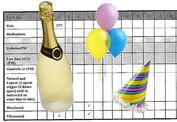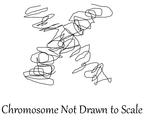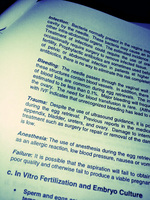 So, tomorrow is a pretty big day. It's Cycle Day One--also known as CD1 on my calendar full of cryptic notes and abbreviations, all related in some way to trying to conceive (TTC). It's a day I've been waiting for since last spring when our one remaining frozen embryo didn't stick. At that point, we decided we were finished with IVF. It was an expensive and emotionally draining road for us to travel, and we had been tapped out of both... no money... no emotion. We had nothing left to give to the process. We destroyed our vials of frozen sperm, filed away our cycle flow sheets and insurance paperwork, brought our leftover medications to the township's "Medical Waste Disposal Day," and moved all of our bags of baby clothes and gear to the attic until we were strong enough to throw them away. But somewhere, in the very back of my biological-clock-driven brain, I knew we weren't finished. I knew that we would somehow find the financial and spiritual means to make it to another CD1. And here we are. This year was filled with challenges. - Challenge 1: Lose weight.
- Challenge 2: Lower blood pressure and cholesterol.
- Challenge 3: Get thyroid function to a healthy and stable range.
- Challenge 4: Cut artificial sweeteners completely.
- Challenge 5: Make peace with God and his plan for us.
- Challenge 6: Save up $20,000 (or find a place to borrow it from).
- Challenge 7: Restock our sperm bank.
- Challenge 8: Ignore the nay-sayers.
We accomplished everything on our list, and we feel good about the position we're in right now. It's going to be another challenging adventure, no doubt, but at least this time, we know that we did everything we could to make this happen. The rest is out of our control.I'm celebrating Cycle Day One tomorrow by drawing a big, fat CD1 on my calendar in hot pink Sharpie marker... because this one is permanent... this one is gonna stick. xoxo
 There's one thing I believe every woman who has ever gone through IVF has had to endure: completely inappropriate comments or suggestions masquerading as advice. I remember when my husband and I first decided to start IVF, I sat my parents down and told them the situation. The conversation is worthy of screen play format: SCENE: Parents' kitchen table. Dad is watching NASCAR on mute. Mom is nervously pouring another glass of wine.ME: We've decided to go ahead with IVF in order to have a baby. It's really the only option given my inability to ovulate and TR's almost complete lack of sperm. MOM: I don't understand why you would rush into something like this. Why not give it some time to see if it happens naturally? That's what's wrong with you kids. Always in a rush. ME: It's not about rushing, Mom. The andrologist was only able to find one single sperm in TR's last specimen... one. MOM: Well it only takes one, honey. Give God a chance. ME: Correction, Mom. It only takes "one" egg. It takes about 600 million sperm. We're 599,999,999 sperm short. MOM: I still don't understand why you won't try on your own for a while first. Give this whole IVF thing a rest. Your father used to just walk up the stairs behind me and I'd end up pregnant. We're very fertile. ME: Okay, I'm done with this conversation. That was totally gross. I share this story because it's so common. The more women I talk to about it, the more stories I hear about unsympathetic parents or relatives who just can't seem to accept the scientific aspect to infertility. It makes sense though, really. Our mothers and grandmothers didn't know all that much about infertility, and they certainly didn't have many options to address it. My grandmother had PCOS, like me, and was able to get pregnant after a D&C. She had 3 children, one right after the next, but as a farmer's wife, she was expected to have many more. She said she always wished she was able to have more children, but it just wasn't in the cards for her. My great uncle was injured during World War II and, after his wounds healed, found that he was sterile. He and my great aunt never had any children because of it. To this day, my great aunt is probably my biggest supporter. She understands the heartbreak of infertility and, despite her deeply religious convictions, prays constantly that each IVF cycle will be a success. She didn't have the option of IVF, but she never once suggested that I give it a rest. She knows what it means to want to succeed at any cost, and I find a lot of my strength in her encouragement. I tap into that strength when I hear things like the following ( list is not exhaustive): - Don't you worry that when you get to the pearly gates, St. Peter will be standing there with all of the embryos that died during your cycles?
- Maybe this miscarriage was God's way of saying you should put this whole IVF thing to rest.
- (As the RE is wheeling me in for my egg retrieval) I don't know where she gets this! Infertility does NOT run in my side of the family!
- I think IVF is selfish. You're doing it because you can't accept that God made you infertile.
- You know all these fertility drugs are giving you cancer, right?
- IVF? What, is your husband shooting blanks?
... and the list goes on.
So, despite the incredibly insensitive comments we may hear, and the cutting retorts we swallow in order to keep the peace, we carry on... plowing ahead, doing what's best for our families, finding solace in the fact that only the infertile can understand the plight of the infertile. We turn to our great aunts and grandmothers who silently cheer us on with an understanding hug or a nightly prayer and ask for the strength to persist through the "advice" that nags at us every so often.
 Delicate red mini roses surrounded by tufts of baby's breath, rich dark chocolates filled with raspberry creme, sexy innuendo-filled dinners by fluttering candlelight--be damned. It's cycle time. And nothing else matters when it's cycle time.
Valentine who?
It's amazing how much will fall completely from your radar when you're preparing to cycle. Sometimes it's because you only have so many brain cells to process everything that IVF demands of you.
How can I think about making dinner reservations when I'm still waiting for a callback from the andrology lab to schedule my husband's next "specimen drop off?" I'm trying to mentally keep track of my estrogen, progesterone, TSH, and FSH levels; I can't even consider listing 101 reasons why I love you.
Other times, it's because you're physically unable to enjoy the things you used to. Thank you, Metformin, for making it impossible for me to enjoy chocolate. Thank you, birth control pill, for that little nagging headache I carry around with me all day. And while I'm at it--thank you, CoQ10, Vitamin D, Synthroid, and prenatal vitamin for keeping me from traveling on an aircraft any time soon. All these pills? I can explain.
And sometimes, as is the case for me right now, you completely lose interest in everything else because you're storing up your emotional energy for whatever this IVF cycle delivers. You may need vast stores of joy and exhilaration if your beta comes back positive. Or, God forbid it, you may need to tap into reserves of tears and drain every last ounce of strength from your heart just to keep going. So, you pause; waiting with wide eyes and a chewed lower lip to figure out what you're going to need to feel next. It's just part of the emotional cost of doing business when it comes to infertility.
So, while everyone is enjoying a very romantic Valentine's Day, we'll be here--at home--discussing sperm counts, follicle stimulating hormones, and how the hell we're going to pay for all of this.
xoxo
 Telegenetic counseling. That's the fancy way to describe a Skype session to get your genetic test results back. I think it's creative, and it's inspiring me to use all kinds of fancy talk around here. (I don't just cook dinner in a Crockpot; I create our meal through a process of prolonged-warmth exposure.)
The good news is that both the hubby and I are chromosomally normal and at a significantly decreased risk of passing any genetic disorders on to our embryos. We're not in the clear, but we've been tested for over 100 different possibilities, and our odds of one of these genetic disorders affecting our offspring is about 1 in a million. Great news for us! But we still have no answer to why so many of our beautiful embryos expire.
I suppose, now, we revert back to the generic "bad egg" diagnosis; and we hope that a 20-pound weight loss is enough to improve my rotten eggs. It's about all we can do as we wait for... Cycle Day One.
 When we met with our RE in early January, our goal was to plan out our next IVF cycle. We looked at all of the past failures, test results, embryology reports, etc. to figure out what we could do differently this time around to finally bring home baby #2. I flat-out asked our doc what the hell was going wrong in the pipeline.
And that's when he said it, "You have a really high arrest rate." Arrest rate? Surely, I shouldn't have to worry about an arrest rate until these embryos are at least 18 years old, no?
He went on to explain that, although they are able to harvest an abnormally high amount of eggs during my retrievals (thanks, PCOS), a large portion of our fertilized embryos simply stop growing. He went so far as to say they look beautiful up until day 5; then they just arrest.
Safely assuming our embryos aren't out drinking in public, urinating in the subways, and vandalizing cars; what else could possibly cause this high arrest rate? This was our next avenue for exploration.
Let me give you an idea of how high our arrest rate actually is. During our last fresh IVF cycle, we had 35 eggs retrieved, 26 fertilized, and only FOUR made it to day 5. Of those four, none implanted. This is a problem, for sure.
My husband and I opted to undergo genetic testing to see if there's any recessive diseases that we're carrying. If we are carrying something, and likely passing it on to our embryos, we would have the ability to test those embryos for the disease BEFORE going through the transfer process. It would mean a big cost savings and, more importantly, an emotional cost savings as well.
We'll meet with the geneticist on February 1st to get the test results. I'm torn. Part of me wants to be completely normal, especially for the sake of the daughter we do have. I want her to never have to worry about passing a disease onto her child one day. But another, very tiny, part of me wishes that they would find something to explain this mess.
 Before you do an IVF cycle, before any shots or pills or surgical procedures, the doc makes you sign an encyclopedia-size pile of consent forms. These forms are designed, I can only assume, to protect the clinic in the event of a mishap, complication, or misunderstanding.
What's so striking about these consent forms though, and our willingness to sign them, is they quite blatantly state that the odds are this procedure will not work. And it's also possible that something will go wrong in the process, either now or eventually down the road when we figure out what all of this hormone manipulation actually does to us. Infection, vaginal bleeding? Bring it on. An increased risk of uterine cancer? They'll have a cure for that soon, right?
Yet, we still sign. I still sign. Heck, most of the time, I don't even bother reading the consents anymore. I may have very well initialed away our home or our beloved family pet this afternoon. But it's worth it. Why? Because we have an opportunity to create a life--an honor that trumps all other risks or likelihoods. I consent to weight gain, blood clots, and the dangerous accumulation of fluid in the abdomen if it means I might, although unlikely, have a baby at the end of it. I consent.
 Looks like it's just about time--time to start another round of In Vitro Fertilization. I'm excited; I really am. I'm hopeful and pretending to think positive all the time. I'm optimistic knowing that I've done just about everything my reproductive endocrinologist has asked of me. I've lost weight (slowly), started an exercise program (Zumba!), lowered my cholesterol and blood pressure (without meds); I've cut back on carbohydrates (sad face), got my thyroid levels in order (thank you, Synthroid), and started seeing a therapist to address stress from previous failed cycles (I feel that...). I've cut from every corner of our family budget to save up for another round of this. I know this cycle is going to be a success. It has to be because it's the last cycle. It's our last chance to give our daughter the sibling she's been asking for.
Amazingly, when she started really talking at two years old, my daughter's first sentence was, "I want a baby sister." It stung. We had been trying since she was six months old to give her that sibling. We thought we would strike while the proverbial iron was hot, and by "iron," I mean uterus, and by "hot," I mean a comfortable 98.6 degrees. We thought it would be so easy. Our first IVF cycle was a gleaming success. No complications. Textbook results through the entire pregnancy, in fact. We had no reason to believe that anything would get in our way of another beautiful child. Seven failed cycles later, however, we were struggling to hold onto hope.
Through all of the failures, I started asking serious questions--Did my doctor really know what he was doing? Was there something I did wrong? Why didn't God intervene? Is there a God at all?--and not-so-serious questions--Are we all just part of the Matrix? Has my uterus become a black hole, a break in the time/space continuum with the sole purpose of swallowing embryos? Is this because I didn't eat the pineapple?
For those of us who've struggled with infertility, and even those who simply wanted to ensure a successful natural cycle, pineapple--pineapple core, to be exact--is a familiar ally. It's magic. The pineapple alters the flavor of your uterine lining and entices the little embryo to implant with the promise of pina coladas, pineapple upside-down cakes, and Hawaiian luaus if it promises to stay put for the next nine months. No, I'm making that up. The real reason we eat pineapple is for the bromelain, an enzyme found most concentrated in the pineapple's core, which may have an anti-inflammatory effect on the uterine lining and help encourage implantation.
With all of my cycles, I laughed at the thought of chomping into the not-so-pleasant core of a pineapple. I mean, it can't really be true, right? Why not blend it up with an eye of newt and one strand of hair from a wild unicorn? But here I am, about to start cycle eight, and guess what--this time, I'm going to eat the freaking pineapple. This time around, I'm keeping my uterus as horizontal as possible until my embryos stick. I'm not reaching for anything above eye level. I'm not even going to inhale the caffeinated scent of coffee. I'm taking Vitamin D supplements. I'm even doing laser acupuncture. And, most importantly, I'm writing this.
I'm writing the story of my final fresh IVF cycle (and hopefully a frozen cycle to follow if we get enough embryos) because I've been doing this for too long not to. I've learned too much about myself, my relationship with my husband, and the miraculousness of our daughter to just let this go by and only vaguely remember what it was like in ten years. I'm writing this to share because I know "infertility" is a dreaded word, but it's also the name of one amazing community of women and men who have a special, nuanced perspective on life and its foundation. And I'm writing this to create something so that even if I don't walk away with a baby in the end, I have a story to share one day with this precious three-year-old who just wants a baby brother or sister.
xoxo
|








 RSS Feed
RSS Feed